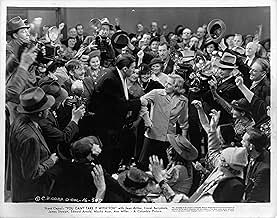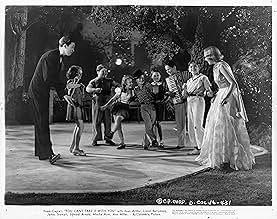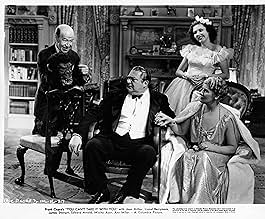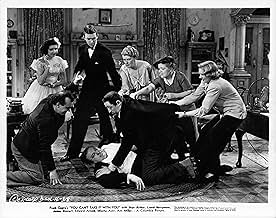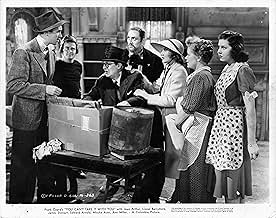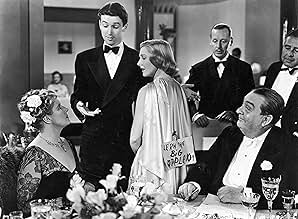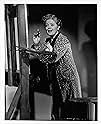Vous ne l'emporterez pas avec vous
Titre original : You Can't Take It with You
- 1938
- Tous publics
- 2h 6min
NOTE IMDb
7,8/10
30 k
MA NOTE
Un homme issu d'une famille riche et snob se fiance à une femme issue d'une famille gentille, mais franchement excentrique.Un homme issu d'une famille riche et snob se fiance à une femme issue d'une famille gentille, mais franchement excentrique.Un homme issu d'une famille riche et snob se fiance à une femme issue d'une famille gentille, mais franchement excentrique.
- Réalisation
- Scénario
- Casting principal
- Récompensé par 2 Oscars
- 6 victoires et 7 nominations au total
Eddie 'Rochester' Anderson
- Donald
- (as Eddie Anderson)
Avis à la une
One message. "Nothing is worth doing if you can't enjoy it, and when it's over- you can't take it with you!"
Do any of Capra's works actually speak 'that' one particular message? Perhaps the closest to the above is "It Happened One Night". "Lost Horizon" is about rediscovery and peace of mind. "Mr Smith" is politically and small town oriented and "Mr Deeds" deals with the same except without some political yawn. George Bailey should have had a better dosage of the "You Can't Take it With You" policy in "It's a Wonderful Life".
Here is a play that exercises Frank Capra's famous adage with all humour already built in. Why shouldn't it work?
The stage version was a phenomenal success, written superbly by George S. Kaufman and Moss Hart. If their story is slightly lacking, look no further than the delightful cast of characters. Mr Poppins, toy and mask maker. Alice's Father who meddles with fireworks. Essie the ballerina, Penny the playwright and the wonderful Russian ballet teacher. The uptight Kirby banking corporation. Then there's the "Mr Smith" duo, Tony (Jimmy Stewart) and Alice (Jean Arthur).
The stand out performer here, is naturally the lovable Lionel Barrymore as Grandpa Vanderfhoff. Although the first film in which the damaging effects of his arthritis began to show, Capra had his leg put in a cast and had him move around on crutches. He relishes his performance.
I have heard of complaints which discuss the fact this film fails to address corruption and greed in a similar manner to "Mr. Smith Goes to Washington" which successfully played its part going against the American capital. Once again, Capra emphasises his favourite theme of the little guy up against the world and succeeds, but "You Can't Take it With You" basically does not even make a mild attempt to criticise the American system of government, past or present, even though I know very little about it.
On different levels, look at this film in the light of discussing heavier issues, as the aforementioned greed and corruption. I just don't think Mr Capra would have liked it as much for one of his works to be remembered like that, especially with the basic message staring at us right in the face.
Nevertheless, it is another of Capra's life saving feel good movies. All it is encouraging us to do is to have a little fun.
Rating: 8/10
Do any of Capra's works actually speak 'that' one particular message? Perhaps the closest to the above is "It Happened One Night". "Lost Horizon" is about rediscovery and peace of mind. "Mr Smith" is politically and small town oriented and "Mr Deeds" deals with the same except without some political yawn. George Bailey should have had a better dosage of the "You Can't Take it With You" policy in "It's a Wonderful Life".
Here is a play that exercises Frank Capra's famous adage with all humour already built in. Why shouldn't it work?
The stage version was a phenomenal success, written superbly by George S. Kaufman and Moss Hart. If their story is slightly lacking, look no further than the delightful cast of characters. Mr Poppins, toy and mask maker. Alice's Father who meddles with fireworks. Essie the ballerina, Penny the playwright and the wonderful Russian ballet teacher. The uptight Kirby banking corporation. Then there's the "Mr Smith" duo, Tony (Jimmy Stewart) and Alice (Jean Arthur).
The stand out performer here, is naturally the lovable Lionel Barrymore as Grandpa Vanderfhoff. Although the first film in which the damaging effects of his arthritis began to show, Capra had his leg put in a cast and had him move around on crutches. He relishes his performance.
I have heard of complaints which discuss the fact this film fails to address corruption and greed in a similar manner to "Mr. Smith Goes to Washington" which successfully played its part going against the American capital. Once again, Capra emphasises his favourite theme of the little guy up against the world and succeeds, but "You Can't Take it With You" basically does not even make a mild attempt to criticise the American system of government, past or present, even though I know very little about it.
On different levels, look at this film in the light of discussing heavier issues, as the aforementioned greed and corruption. I just don't think Mr Capra would have liked it as much for one of his works to be remembered like that, especially with the basic message staring at us right in the face.
Nevertheless, it is another of Capra's life saving feel good movies. All it is encouraging us to do is to have a little fun.
Rating: 8/10
Take a large free-spirited family without visible means of support. Add a large mean-spirited tycoon intent on taking over their neighborhood. Mix in a romance between their daughter & his son. Sprinkle with zaniness & bake for two hours. Enjoy while hot.
This is one of those big comedy productions with a huge cast that only someone like Frank Capra could have pulled off. That he did so, winning the 1938 Best Picture Oscar, is immensely to his credit.
Hobbling on the crutches that signaled the crippling arthritis that would soon confine him to a wheelchair, Lionel Barrymore is the focal point of the film as the grandfather of a wacky clan that believes in doing whatever makes them happy. So they dance, make fireworks, bake candy, paint, write novels, and construct toys with equal joy - laughing through the Depression with much love & great contentment. Jean Arthur, James Stewart & Edward Arnold co-star, with a mammoth cast of supporting players.
This is the movie for viewers who want to feel warm & safe & cuddled & protected.
This is one of those big comedy productions with a huge cast that only someone like Frank Capra could have pulled off. That he did so, winning the 1938 Best Picture Oscar, is immensely to his credit.
Hobbling on the crutches that signaled the crippling arthritis that would soon confine him to a wheelchair, Lionel Barrymore is the focal point of the film as the grandfather of a wacky clan that believes in doing whatever makes them happy. So they dance, make fireworks, bake candy, paint, write novels, and construct toys with equal joy - laughing through the Depression with much love & great contentment. Jean Arthur, James Stewart & Edward Arnold co-star, with a mammoth cast of supporting players.
This is the movie for viewers who want to feel warm & safe & cuddled & protected.
You Can't Take It With You won for Best Picture of 1938 and got Frank Capra his third Oscar for Best Director. Looking at it now it is firmly anchored in the decade that spawned it and the Oscar is a tribute to authors Kaufman and Hart and their popularity in that time. You Can't Take It With You came off a Broadway run of 838 performances for the 1936-1938 Broadway seasons.
It's a tale of two men and their families. Edward Arnold plays Anthony Kirby millionaire banker and industrialist who is obsessed with both making money and his social position, though the latter is more in deference to his snooty wife Mary Forbes. Their son James Stewart is preparing uneasily to step into his father's world. What really is Stewart's main interest is the romance he's got going with the only normal member of that other family, Jean Arthur.
Her grandfather is the second man with a family. A very extended family that all lives under one roof because that's how Lionel Barrymore as Grandpa Vanderhof likes it. He's got a daughter who writes unpublished plays, a son-in-law who likes to experiment with fireworks, a granddaughter who aspires to be a ballerina, her husband who is a xylophone virtuoso and an iceman who was so taken with the house he just quit his job and stayed there. I can't really blame Halliwell Hobbes the iceman. If I was being supported by Jean Arthur's salary as a secretary and Lionel Barrymore's investments, I'd quit working myself.
In fact I can understand Barrymore's sentiments. I had an opportunity to retire early myself and took it and don't regret it. Of course I'm not supporting a whole extended family either. Let Sanuel S. Hinds, Spring Byington, Ann Miller, and Dub Taylor go out and earn a little and then become bohemians.
Both Arnold and Barrymore are extreme in their philosophy and the play and film are weighed heavily in Barrymore's balance. But looking at it objectively, Barrymore has a more realistic outlook for most people. There are a couple of dinner scenes at the Vanderhof house and it looks like quite a feed. Who's paying for it?
This was James Stewart's first and Jean Arthur's second film with Frank Capra. Next year they would do their second and last in the much acclaimed Mr. Smith Goes to Washington.
In doing the screen adaptation, Capra and screenwriter Robert Riskin created a whole new character in Mr. Poppins played by Donald Meek. Poppins is an inoffensive little bureaucrat who would rather make little toys than add columns of figures all day. One meeting with Lionel Barrymore persuades Donald Meek to follow his dream. He blended so well into the Vanderhof household that Kaufman and Hart praised his creation.
Though You Can't Take It With You is dated it is still funny as all get out. And you haven't lived until you've heard Brahm's Hungarian Dance Number 5 done as a xylophone solo.
It's a tale of two men and their families. Edward Arnold plays Anthony Kirby millionaire banker and industrialist who is obsessed with both making money and his social position, though the latter is more in deference to his snooty wife Mary Forbes. Their son James Stewart is preparing uneasily to step into his father's world. What really is Stewart's main interest is the romance he's got going with the only normal member of that other family, Jean Arthur.
Her grandfather is the second man with a family. A very extended family that all lives under one roof because that's how Lionel Barrymore as Grandpa Vanderhof likes it. He's got a daughter who writes unpublished plays, a son-in-law who likes to experiment with fireworks, a granddaughter who aspires to be a ballerina, her husband who is a xylophone virtuoso and an iceman who was so taken with the house he just quit his job and stayed there. I can't really blame Halliwell Hobbes the iceman. If I was being supported by Jean Arthur's salary as a secretary and Lionel Barrymore's investments, I'd quit working myself.
In fact I can understand Barrymore's sentiments. I had an opportunity to retire early myself and took it and don't regret it. Of course I'm not supporting a whole extended family either. Let Sanuel S. Hinds, Spring Byington, Ann Miller, and Dub Taylor go out and earn a little and then become bohemians.
Both Arnold and Barrymore are extreme in their philosophy and the play and film are weighed heavily in Barrymore's balance. But looking at it objectively, Barrymore has a more realistic outlook for most people. There are a couple of dinner scenes at the Vanderhof house and it looks like quite a feed. Who's paying for it?
This was James Stewart's first and Jean Arthur's second film with Frank Capra. Next year they would do their second and last in the much acclaimed Mr. Smith Goes to Washington.
In doing the screen adaptation, Capra and screenwriter Robert Riskin created a whole new character in Mr. Poppins played by Donald Meek. Poppins is an inoffensive little bureaucrat who would rather make little toys than add columns of figures all day. One meeting with Lionel Barrymore persuades Donald Meek to follow his dream. He blended so well into the Vanderhof household that Kaufman and Hart praised his creation.
Though You Can't Take It With You is dated it is still funny as all get out. And you haven't lived until you've heard Brahm's Hungarian Dance Number 5 done as a xylophone solo.
This is not the play. This is better.
The madcap adventures of a crazy family during the depression is a life affirming film that shows us that money isn't everything and that yes, you can't take it with you.
One of the joys of this film is the cast Lionel Barrymore, Jimmy Stewart, Ann Miller, Dub Taylor, Edward Arnold, Eddie Rochester Anderson, Misha Auer and just about every great supporting actor and actress under the sun, all acting completely and wonderfully mad. They sell the story and make you smile from ear to ear.
I can't be rational where this film is concerned.
Just see it.
You'll feel good for days.
10 out of 10.
The madcap adventures of a crazy family during the depression is a life affirming film that shows us that money isn't everything and that yes, you can't take it with you.
One of the joys of this film is the cast Lionel Barrymore, Jimmy Stewart, Ann Miller, Dub Taylor, Edward Arnold, Eddie Rochester Anderson, Misha Auer and just about every great supporting actor and actress under the sun, all acting completely and wonderfully mad. They sell the story and make you smile from ear to ear.
I can't be rational where this film is concerned.
Just see it.
You'll feel good for days.
10 out of 10.
Among all the enthusiastic reviews for this movie, it is hard to find a sufficiency of praise for the work of Edward Arnold. A familiar face on the screen in the thirties and forties, with his round face, solid body, and trademark pince-nez, Arnold surpasses himself in this film
Too often type-cast as a plutocrat, Arnold nevertheless demonstrates nuance and sensitivity as a man who, despite many flaws and faults, is redeemed by his love for his son. Arnold is seldom credited with the subtlety and poignancy of his characterizations, probably because he generally played greedy capitalists in a time when greedy capitalists were even more frightening than they are (and properly so) now, but this is an omission that should be corrected. His characterization in this comedy is a powerful performance, and grossly under-appreciated. He was one of the masters of American cinematic acting, with never a false note on his performances, and it is shameful that he is not so acknowledged.
Too often type-cast as a plutocrat, Arnold nevertheless demonstrates nuance and sensitivity as a man who, despite many flaws and faults, is redeemed by his love for his son. Arnold is seldom credited with the subtlety and poignancy of his characterizations, probably because he generally played greedy capitalists in a time when greedy capitalists were even more frightening than they are (and properly so) now, but this is an omission that should be corrected. His characterization in this comedy is a powerful performance, and grossly under-appreciated. He was one of the masters of American cinematic acting, with never a false note on his performances, and it is shameful that he is not so acknowledged.
Oscars Best Picture Winners, Ranked
Oscars Best Picture Winners, Ranked
See the complete list of Oscars Best Picture winners, ranked by IMDb ratings.
Le saviez-vous
- AnecdotesAnn Miller was only 15 years old when this movie was filmed. Her character is called on to perform numerous (amateur) ballet positions, including dancing en pointe. She had never been trained to do so, and wasn't using shoes with the proper support. She was just forcing her feet up onto their toes, which was very painful for her. She hid this from the cast and crew, but would cry (out of sight) off stage. James Stewart noticed her crying, though he didn't know why, and would have boxes of candy to make her feel better.
- GaffesWhen Alice is in the courtroom, she is wearing a trench coat as newspaper photographers take pictures. In the newspaper pictures, she is not wearing the coat.
- Citations
Grandpa Martin Vanderhof: Lincoln said, "With malice toward none, with charity to all." Nowadays they say, "Think the way I do or I'll bomb the daylights outta you."
- ConnexionsEdited into The Three Stooges Meet Hercules (1962)
- Bandes originalesValse Brilliante Op. 34 No 2
(1838) (uncredited)
Music by Frédéric Chopin
Played on an xylophone by Dub Taylor
Meilleurs choix
Connectez-vous pour évaluer et suivre la liste de favoris afin de recevoir des recommandations personnalisées
- How long is You Can't Take It with You?Alimenté par Alexa
Détails
Box-office
- Budget
- 1 644 736 $US (estimé)
- Durée
- 2h 6min(126 min)
- Couleur
- Rapport de forme
- 1.37 : 1
Contribuer à cette page
Suggérer une modification ou ajouter du contenu manquant


